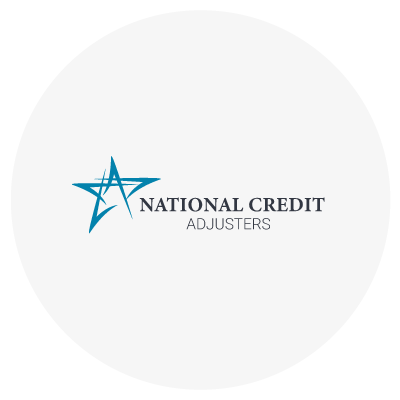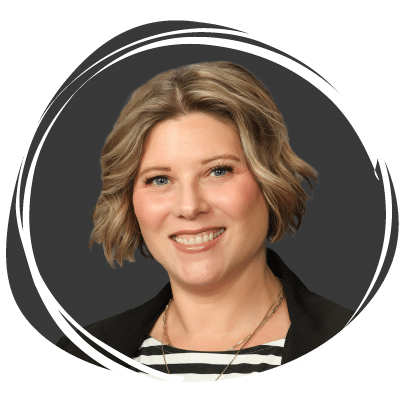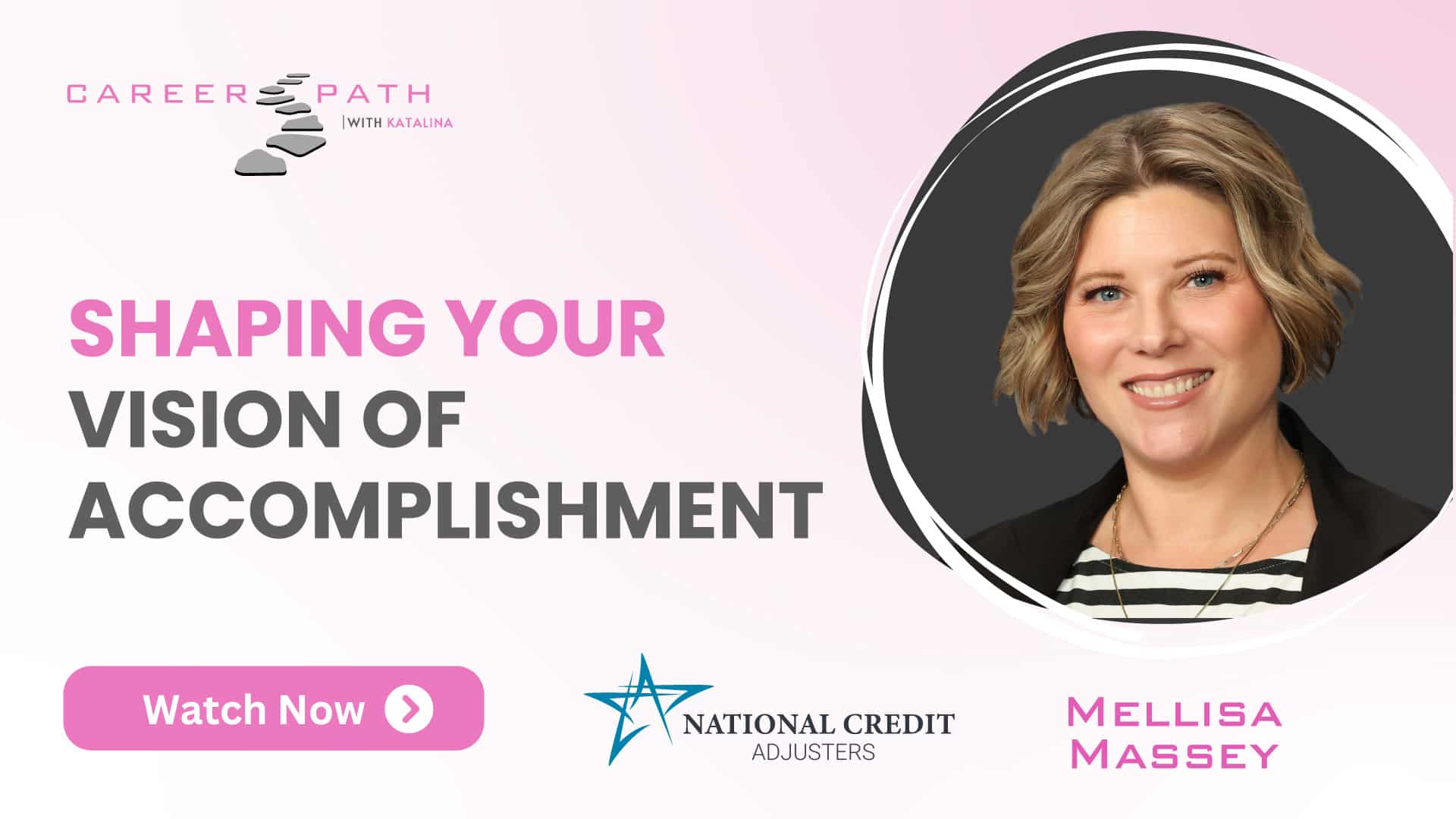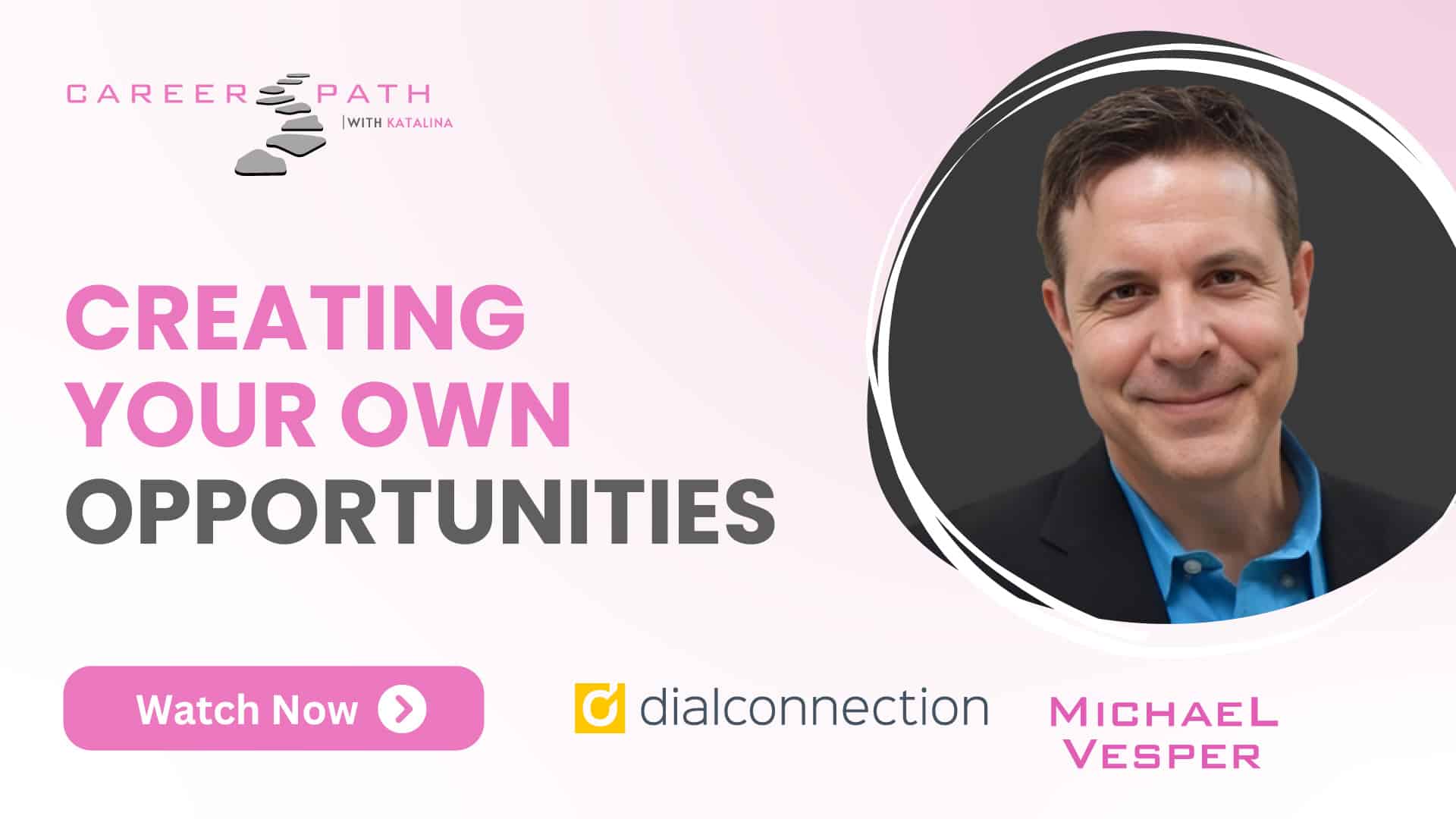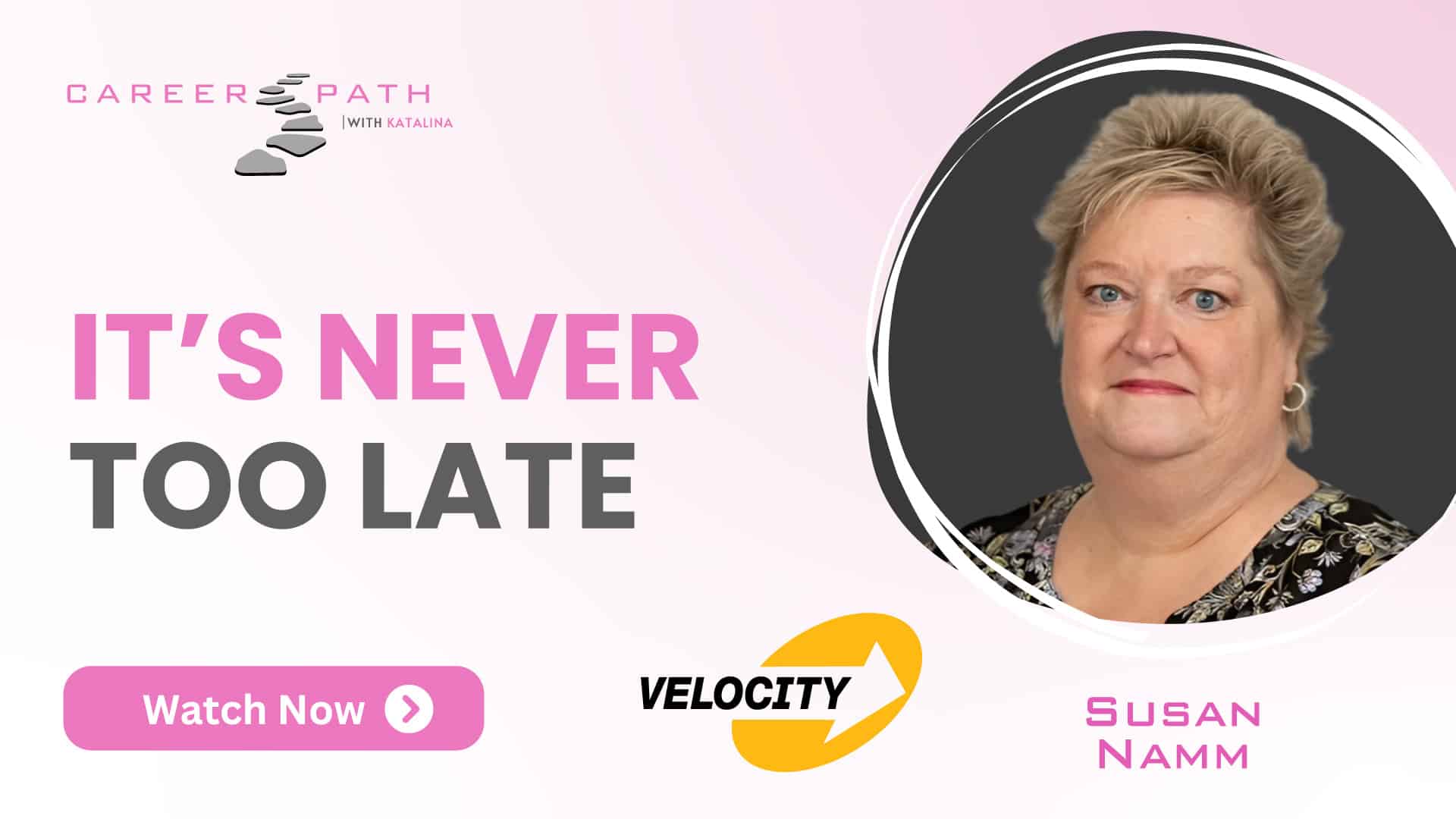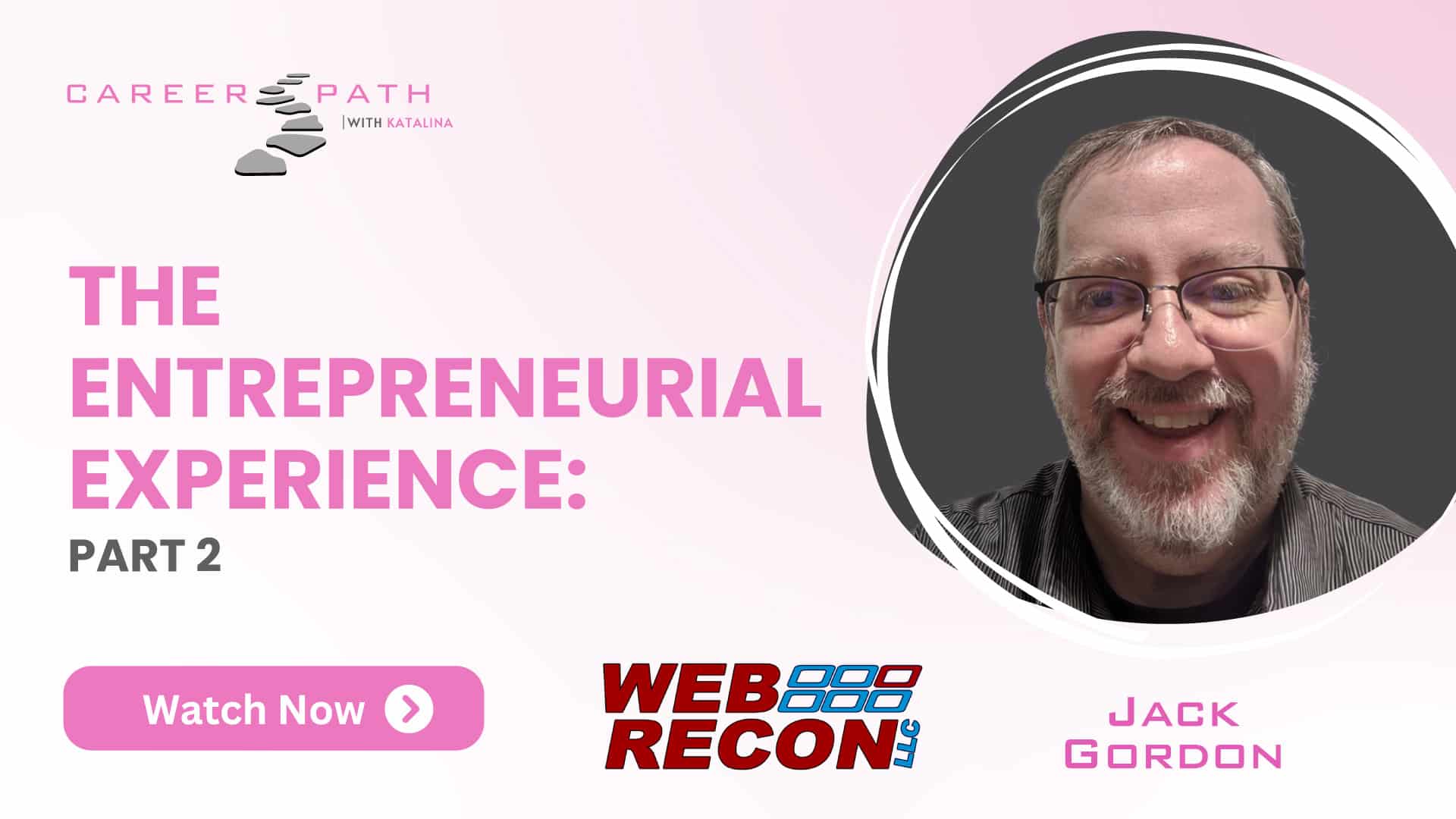Katalina Dawson (00:10)
Hello and welcome back to another episode of Career Path. I am your host, Katalina. Today we are covering the topic Shaping Your Vision of Accomplishment. And here to discuss that topic with me, I have the incredible Mellisa Massey. Now, for those of you who don't know Mellisa Massey or as the ones who do know her as she is the Director of Business Development at National Credit Adjusters.
She is also RMAI certified and a current member of the RMAI board. Missy, thank you so much for joining me today. It's a pleasure to have you.
Missy (00:42)
Thank you so much for having me. It's an honor.
Katalina Dawson (00:44)
Thank you. Well, before we hop into our topic, as always, I would love to hear a little bit about yourself and how you got to where you are today.
Missy (00:54)
So based on our topic, I'm going to take a different approach to my background and hop back to when I was a kid. I desperately wanted to work at Target. It was the it job when we were in high school, right? So imagine the 16 year old looking for my first real job in the world and there was a new Target store that opened and
Katalina Dawson (01:00)
Okay.
that's so cute.
Missy (01:16)
everybody applied. So it was impossible to get in. So I had to submit two applications. And I think this is probably one of those first lessons of your network is everything. My neighbor had a job there and she was a team lead and was able to push my application the second time around to the front of the pile. So I got an interview and I got a job and thus started what was unbeknownst to me, my trajectory into a 16 year career with Target.
Katalina Dawson (01:26)
Mm.
Nice.
Missy (01:42)
I stayed in the stores for a little while while I was in school. I had a friend who was a team lead at the store, moved to the credit division. So Minneapolis, Minnesota is headquarters for Target Corp. He called and said, hey, this call center supports all of the credit products for what was at that point the Dayton Hudson Corporation.
You guys got to come down here. It's so neat. So we went down and interviewed me and a few friends from the store and I ended up in the customer contact center. Answering back before there were IVRs and everybody logged onto the internet to check their credit card balances or get whatever questions you had answered about your account. You would call, right? So I was a customer service rep for a little while and then moved into a team lead role.
Katalina Dawson (02:10)
Hmm.
Okay.
Missy (02:26)
found myself in an early leadership position in collections. So bucket one and bucket two, imagine, hey, I'm calling you today because you're one month behind on your Target account. And at that point, collections is a little bit different than it is on the back end as we know it in receivables management. But it was the catalyst to a 25 year now career in recovery and receivables management. So after some time with Target,
moving through entry level positions into medium middle management and then operational role positions. I left and went to a larger debt buyer. I spent a few years there, worked for a law firm where we did network and law firm legal forwarding for large credit issuers. And I started at NCA 10 years ago. So it's been an interesting journey across quite a few states. But if
I look back and say, why did I end up in recovery? What was that move between, okay, early stage delinquencies and agency management, law firm management? I wanted to travel. Why did you start working in recovery, Missy? I wanted to go places. Not because it sounded interesting. Well, it kind of did, but I wanted to travel. And I was in my early 20s and it just seemed like the really glamorous life.
Katalina Dawson (03:39)
Yeah!
Missy (03:48)
That's how I got started in recovery.
Katalina Dawson (03:54)
I love that! I had no clue that not only did you work for Target, but that you had a 16 year long career there. That is so cool.
Missy (04:01)
The perspective on that is I left at the age of 32 and I had literally worked there half my life.
Katalina Dawson (04:07)
Wow. Well, that's dedication first, but I love that you brought in your different goals and what you saw as accomplishment at that time is what really drove your career path in the two different halves of your life. That's so interesting and perfect for our topic. So let's talk a little bit about your personal definition of success, not just you, but like everybody's personal definition of success.
Missy (04:10)
Right?
So it's going to change over time, Your definition of success is very different when you first start out in the professional world. And if you had asked me what my definition of success was at, say, 22 when I got started versus 32 when I made a very large life change versus today, I'm not going to tell you my age today, but it's old enough.
Katalina Dawson (04:36)
Mm-hmm.
Missy (04:58)
It'll vary and things change over time. in my early years, if we're going to go back and look at those motivator types, I would say that initially my definition of success was very extrinsic driven. Salary raises, recognition, promotional opportunities, growth. What we thought
Katalina Dawson (05:00)
Yeah.
Mm-hmm.
Yeah, absolutely.
Missy (05:20)
career building or what climbing the corporate ladder would look like, right?
Katalina Dawson (05:24)
So let's dive into those three motivator types. So when you and I initially talked about this topic, I brought up the idea of three main motivator types. There's definitely like subcategories and things, but the three main ones are extrinsic, which is things outside of you, incentives like money, like promotions that...
are things that drive you. Then there's the intrinsic, which are more internal things. Like you want the knowledge, you want the networking, you wanna build that community. And then there's power, there's having that recognition, having that title, having the ability to do things. So throughout your life, those have definitely changed. And I can say for sure they've even changed for me in small amounts of time.
There's definitely a demonization of people who are like, money is what drives me. But right now I'm at a point in my life where I'm looking at hopefully getting married in the coming years, which also means we're kind of talking about maybe having kids when we get married. So that's like planning for children, which is expensive. And then also planning to maybe buy a house. So a wedding, children, a home, all very, very expensive things in your life. So right now I would say,
Missy (06:32)
Good.
Katalina Dawson (06:33)
I am very monetarily motivated. I want to make sure me and my family have this nice financial stability. So that's a huge motivator for me. But that also doesn't mean that that excludes me from the intrinsic or the other different values. I want to have the knowledge. I want to have recognition in different areas, but it is a primary motivator for me right now. Absolutely.
Missy (06:56)
You're building your future.
Katalina Dawson (06:59)
Absolutely. So how would you say societal pressures have affected you or could affect people within this?
Missy (07:07)
You covered a lot of them over the last 30 seconds, right? So I can't tell you how many times I was asked between marriage and probably the age of 40, when are you going to have kids? That's a huge societal pressure or just even from a sense of comparison.
Katalina Dawson (07:33)
Mmm.
Missy (07:34)
I worked for a company that was large, right? A Fortune 50 company. What a great place to grow at a young age and learn, have tons of layers of management, mobility opportunities, training and professional development. But at the same time, it was very competitive. So societal pressures being, am I keeping up? Or, you know, the folks that were my peers.
Katalina Dawson (07:49)
Mm-hmm.
Missy (07:56)
you know, where are they, where am I? And let me tell you, comparison is the thief of all joy. Don't let that get you, but there's probably a million others that I've not covered, but for me, those two are probably the most present as I look back and think about how I...
Katalina Dawson (08:01)
Thanks.
Mm-hmm.
Missy (08:13)
took stock of where I was at each step in my career.
Katalina Dawson (08:16)
Mm-hmm. Yeah.
Well, there's so many societal pressures, even with like what industry you're in or what your role or your title is. Say you got that job at Target today, people might look at you differently, be like, you only work at Target? Like there's a lot of pressure to that. Whereas at that point in your life, you actually might be like, I'm financially stable and, you know what?
I like working at this Target because my goals right now are to have more of a sense of community and to have more flexibility with my schedule to be with my kids. But people are judging you and putting that pressure on you just because of a title role or what industry you're in. I mean, we can also even dip into the fact that our industry can be very villainized with our titles and so forth.
Missy (09:02)
Sure,
sure. I think that over time as well,
As you take on different roles in your personal life, your personal motivations change and it's not just what you're planning to be, it's what happens. And if I had seen what was coming from 22 to 32, I would have laughed, right? You told me you're gonna get a divorce, move across the country, start a new job with a new company that's half the size, less than half the size of the one that you're working for and you're gonna love it.
Katalina Dawson (09:21)
Mmm.
Missy (09:31)
And then in a few short years, you're going to take a supporting role in your family. And that supporting role being, you know, needing to have a position that maybe doesn't put me on the road as much and gives me the flexibility to be at home and allows me to help raise my stepdaughter and support my other half who runs a successful business. Right? So I went from chasing my own
Katalina Dawson (09:36)
Mm.
Missy (09:57)
career trajectory to taking a back seat almost, still in a very present way.
Katalina Dawson (10:02)
Mm-hmm.
Missy (10:05)
That shift if you don't see it coming or you're not prepared for it ingrained in that intrinsic mindset, shifting to an intrinsic can be...
Katalina Dawson (10:15)
Mm.
Missy (10:17)
I will say difficult, but life altering.
Katalina Dawson (10:20)
Yeah, yeah, absolutely. I want to round the end of this big thought off with what you had brought up when we originally talked about this topic, because ultimately at the end of this, you want to think about what your legacy is. So you talked a lot about how ultimately that is
Missy (10:37)
Mm-hmm.
Katalina Dawson (10:43)
a big piece of your vision of accomplishment.
Missy (10:46)
It is. For a long time, it was keeping score, I'll say. It was what bullet points can I build my resume with? What were my accomplishments? How much revenue did I drive for the organization? And that's still important, right? Your individual contributions are still important. But I feel like over time, you focus more on the subjective than the objective. You're not focusing as much on the accolades and the resume builders.
but thinking more about how you can make impacts that are not only measurable, but memorable. Who are the people that stood behind you that have gone on to build successful careers of their own? And that's really my true legacy is I've, I've, know I've had meaningful impact on the lives of many people and either...
Katalina Dawson (11:16)
Holy.
Mm-hmm.
Missy (11:33)
through direct leadership or through mentorship put them on a path to their own personal success.
Katalina Dawson (11:40)
And I think that, that is kind of the key to starting forming that vision of what an accomplished you is. It's understanding that the main motivators are going to change, but holding in your heart whatever that kind of legacy is that you want to leave, no matter which stage that you're at.
So the fact that you brought it up and you started talking about how to do that is really incredible. And I loved your insight on it. So I really wanted to dive into how you would craft your own vision statement.
Missy (12:10)
Ooh, okay. So I learned from some early lessons again.
in my first real career with Target. And again, being in that super competitive environment, I had exposure to great leaders and okay leaders. I had exposure to peers that were helpful and peers that were more concerned for their own good, for their own being than actually being helpful or supportive of their team. So
dealing with folks that you go to ask a question and you get a partial answer or you get pointed in the wrong direction and you're forced to just of figure it out on your own. And when you do realize, all right, they intentionally left out information or what that was, was malicious. I guess for me, really solidified
Katalina Dawson (12:56)
Mm-hmm.
Missy (13:00)
in my mind early on that I was always going to be somebody who selflessly shared knowledge. Doesn't matter if it's to somebody that's working for me or working alongside with me or somebody I'm reporting to. There's no value in hoarding or keeping information for your own self-benefit if it doesn't help your team.
Katalina Dawson (13:06)
Hmm.
100%. Absolutely.
Missy (13:26)
So I think that's one
of my primary values is selflessly sharing information.
Katalina Dawson (13:32)
Yes. And you discovered that by observing your environment and seeing what people were doing and going, hey, this is who I want to be.
Missy (13:40)
Right. That's who I don't want to be. Right.
Katalina Dawson (13:42)
Or yeah, rather good point. That's who I don't want to be, which is how you're able to craft who you do want to be. So that's a great way. Are there any other ways you would suggest people to go about crafting their own vision statement or who they want to be, what kind of legacy they want to have?
Missy (13:58)
Really, when you think about leadership, leadership being...
leadership isn't a goal, but it's a way to get a goal accomplished. Right? So, again, working with a big variety of, of, of people over the years, I've learned that folks that are the most impactful, are, people that aren't afraid to get in and work and, and not just teach, but do.
Katalina Dawson (14:23)
Mm-hmm.
Missy (14:24)
So I've always been one to, I've never been afraid to get my hands dirty, right? If something needs fixed, let's figure it out. What's the objective? What are our goals? What's the deadlines? What can you take? What can I take? And let's dig in together.
Katalina Dawson (14:37)
So you craft your own vision statement by doing. By doing, I love it.
Missy (14:40)
by doing, right? And I've always
been that kind of person, right? I'm a learn by doing, I'm a very visual person. So I don't want to sit around and wait, I just want to get in and get things working.
Katalina Dawson (14:53)
Love it. So can we talk a little bit about setbacks and failure and how that works with your own personal sense of accomplishment?
Missy (15:02)
Sure, I think setbacks and failure take a lot of self-reflection and self-realization. What you may not think of as a setback or a poor decision presents itself as a learning opportunity maybe at a later time.
Katalina Dawson (15:06)
Mmm.
Missy (15:14)
But there's some career moves that I made that although I know that they put me on the path to where I am today, I wish I had asked more questions, understood
Katalina Dawson (15:24)
Mm-hmm.
Missy (15:29)
the true scope of the position or the shape of the organization or the risks and the vulnerabilities. Is there longevity here? Is the person that's hiring me, is that somebody that seems to be a good fit, right?
Katalina Dawson (15:49)
Mm-hmm.
Missy (15:50)
is their leadership style one that works well with how I operate. So there are times where, sure, I've taken leaps and put myself in places where, looking back I maybe would have made a different decision. But at the end of the day, I don't have regrets. And it's taught me a lot about how to push forward and approach.
Katalina Dawson (16:12)
So overall,
would you say that in those times of setback, it hurt your vision of you being accomplished or that it more helped it because it sculpted what you didn't want to be or that it kind of set you
Missy (16:27)
So I wouldn't say setback. It definitely puts your mind in a place of self-doubt, right? If you question your capabilities and why you're there in the first place. And I know you had a whole imposter syndrome conversation with one of my favorite people. imposter syndrome is real. And if you're not supported, it certainly can
Katalina Dawson (16:34)
Mmm.
Mm-hmm.
Yes.
Missy (16:53)
bring on a whole level of
mental challenges. It'll really, know, imposter syndrome makes you question your whole purpose, right?
Katalina Dawson (16:58)
Mm-hmm.
Yeah, you bring up a really great point there that there is a whole psychology behind achievement. Whether that's struggling to form your vision of accomplishment or struggling to feel like you can do it. There's even further points where it can be affecting your psychology, like the imposter syndrome, or like maybe you achieved something, but you don't feel that sense
of achievement, even though you hit those milestones, whether it's that self doubt, whether it's imposter syndrome, how do you combat that?
Missy (17:37)
You find something that in that role brings you joy. Just pick out the pieces that you know you're good at and that made a difference. You have to find the nuggets, right? And that helps. Knowing that you made an impact on some of the people that worked with you or you were able to mentor somebody or you were able to build a process that didn't exist before.
Katalina Dawson (17:51)
Mmm.
Missy (18:04)
It's just focusing on the positives and knowing that.
You were there for a reason, right? And you did accomplish something.
Katalina Dawson (18:10)
Yeah.
And it sounds like based on what you're saying with the nuggets, recognizing how far you've already come. Maybe you don't feel accomplished because you're looking up at this peak of a mountain and you're like, ugh, I'm so far away. But if you look back, you've already trekked up more than half of the mountain. So by looking at those little nuggets, by like taking a look and taking stock at where you've been
can make a huge difference in that psychology of accomplishment.
Missy (18:40)
Or even to have somebody on your team look at you and say, this has been an incredibly challenging position. If you can get through this, you can do anything. Just hearing affirmation from a coworker, right, makes the world of difference.
Katalina Dawson (18:51)
Yes.
Mm-hmm.
I love that. Now, when we also originally talked about this topic, you had some really critical lessons that you shared with me that you have learned through points in your career where your sense of accomplishment either changed or you had a change in your expectations of yourself and so forth. Can you share a little bit about that?
Missy (19:20)
Sure. I think early on I learned that FOMO is real. And again, in a competitive environment, if you're new in your position and you're not getting the glamorous projects or somebody gets to do something that looks like a lot of fun and you'd rather do that instead, well, learn that it's important to do your core job and
Katalina Dawson (19:26)
True.
Missy (19:44)
master the basics, right? Understanding that you have to be good at what you were hired to do before you can take on the next.
Katalina Dawson (19:46)
Yes.
Yeah, don't bite off more than you can chew. That makes so much sense. You have this expectation of success for yourself, but you might not be at that level yet. So taking stock of where you're at and mastering those basics, I love that.
Missy (19:53)
Exactly.
Right.
And then again, once you've proven yourself, right, or you get to a point where you recognize that you're an expert, you'll probably find yourself in a place where you create your own projects. You find things to fix and you get to do more glamorous things, not because somebody asks you to do them, because you just found them and you're doing them yourself.
Katalina Dawson (20:29)
Mm-hmm.
Missy (20:30)
And I think that, that was another critical lesson is don't expect opportunities to be handed to you, right? Prove yourself, earn it. And you'll find that once...
you've really dug in and committed, you're going to create your own opportunities.
Katalina Dawson (20:49)
I love that. This is kind of silly side note, but like, I love the idea of earning something because that to me, that's one of my biggest visions of accomplishment is actually earning something through hard work. And there's always been a small part of me that like, you know you buy a lottery ticket here or there, and there's even a small part of me that's like, I don't want it. Cause if I win it, I never earned it.
Missy (21:11)
I never
Katalina Dawson (21:13)
I would much rather become rich, successful, blah, blah, because I put in really hard work, not because I happen to get a number drawn out of a bowl. There's this whole sense of accomplishment that comes from really working for something and proving yourself and earning it. There's even, do you know the actor Donald Sutherland, late great? He even said that when he was a very famous actor,
that he never wanted to be handed a role. Even if they're like, the role is yours. Like we want you cast for this role. He's like, well, I would like to audition. Cause I need to go in there and I need to show you what I can do and I need to earn this. So there is such a really great sense of accomplishment that comes with that.
Missy (21:53)
On top of that, I would say that if you have proven yourself, don't be afraid to ask for something either. And I'll use my current role as an example. When I started with NCA, I was brought in for vendor management, which is what I had a long history and had built my career on agency management and specifically legal network management.
And when I started, that's where I was thriving and people quickly realized that I had knowledge in licensing and I could projects and...
analysis with some of our compliance functions. So I was pulled in a lot of different directions, eventually moved into a project manager role. And at the end of what I'll call a transitional phase for our company, I sat down and looked at our CEO and said,
you're going to need somebody to manage acquisitions. And I've always wanted to do that, right? It's the one thing that I hadn't done. I'd been in vendor management, I'd in, I'd manage people, I'd work for the law firm, I'd work for a debt buyer, I've kind of done a little bit of everything within our business, but I'd never managed purchasing receivables management company. And that was just in the back of my mind, I guess.
Katalina Dawson (22:49)
Mm-hmm.
Missy (23:06)
I would say my personal sense of achievement because subconsciously that's what that was the end game for me is that's the one thing I wanted to do that I hadn't been able to try. So I sat down with him and I said, you're, going to need somebody to manage this for you. And here's how I can help you. I think he kind of joked and kind of laughed it off. And three days later came back and kind of laid out some,
Katalina Dawson (23:15)
Yeah.
Missy (23:28)
We just had a conversation about how I know the industry and gave him some solid belief, we'll say, in leads. And it was just kind of a, well, maybe she can do it, right? So within a few weeks, I had a new job. But it wouldn't have happened had I not put my butt in the chair and said, hey, I can do this.
Katalina Dawson (23:43)
Mm-hmm.
Put yourself out there!
Not.
Missy (23:55)
And let me show you how I can do this. I want to do this. And it happened. So here I am.
Katalina Dawson (23:59)
Mm-hmm. I love that.
It's taking those risks, taking the leap and going for what you want ultimately, even if it's a small thing. So in short, there's motivator types that are part of what your vision of accomplishment can be. There is your ultimate legacy. And there is also small things you want along the way, whether it's the position, whether it's the title, there's a bunch of different
Missy (24:05)
Exactly.
Katalina Dawson (24:23)
things that ultimately form this vision of accomplishment, which can be complex and ever-changing.
Missy (24:29)
100%.
Missy (24:30)
So one last final thought, as you define your personal sense of accomplishment, think about what feels right to you, what accomplishment exists in your brain is going to be what makes you thrive and what gives you joy. It's not about what somebody else says it is or what you think it looks like.
I remind myself of that constantly.
Katalina Dawson (24:55)
Love it. Well, Missy, unfortunately we are out of time, but it was such a pleasure to have you on. I loved hearing about your background and how your own vision of accomplishment has changed over time. This has been a really interesting conversation. Thank you.
Missy (25:07)
It was
a lot of fun. you so much. It's a good way to share my story in a different way.
Katalina Dawson (25:14)
love it. Well, to all of our listeners, thank you so much. If you don't know Missy, she's a great person to get to know, highly recommend connecting. Otherwise, we look forward to seeing you in our next episode. Thanks.
Missy (25:27)
Thank you.
